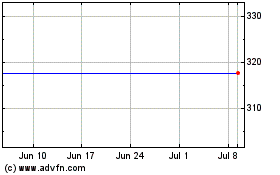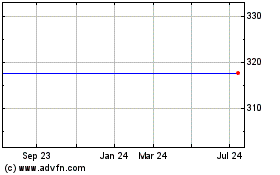By Laurence Fletcher
Some of the world's top hedge-fund managers are worried. They
say central bank bond buying programs that are pumping trillions of
dollars into global markets will end badly.
The European Central Bank said Thursday it would extend its
asset purchase program to the end of next year, buying bonds at a
reduced rate. Prominent managers have told The Wall Street Journal
in recent interviews of their doubts about the endgame for
quantitative easing around the world.
"There's no non-messy way out of this," said Luke Ellis, chief
executive of Man Group, one of the world's biggest hedge-fund firms
with $80.7 billion in assets.
"There's two versions" of how this ends, added Mr. Ellis. Either
central banks could move to so-called 'helicopter money,' where
they buy debt from the government, which then spends the proceeds
or gives it to the population to spend. This "for a few years looks
golden then leads to hyperinflation," he said.
Or the speed at which money circulates within the economy could
grind to a halt. "Then you effectively have a barter economy," he
said.
In a series of exclusive interviews with the Journal, hedge-fund
executives overseeing around $280 billion in total highlighted a
range of problems created by quantitative easing. Often the
problems they highlight are precisely those that QE was designed to
solve.
Damage to economic growth
Rather than kick-starting growth, quantitative easing may do the
reverse.
Some managers fear it distorts financial markets and undermines
capitalism. That system relies on profit-hungry investors to
differentiate between strong and weak companies--funding the strong
while letting the weak die. QE, say some managers, doesn't
differentiate.
For instance, the Bank of England is buying the debt of firms it
deems make "a material contribution" to the U.K. economy. That has
led some investment banks and companies to create new debt
especially for it to buy. The ECB has bought EUR48.2 billion ($51.2
billion) of corporate debt since June, but the hoped-for
private-sector investment hasn't materialized.
"What does a market do? It's a voting mechanism," said Michael
Hintze, billionaire founder of hedge fund CQS, which runs around
$12 billion in assets. "Instead you've got this 800-pound gorilla
out there who's hoovering up assets.
"There's a misallocation of capital and an opportunity cost to
the real economy," added Mr. Hintze, whose portfolio is up 30% this
year, ranking it one of the world's top-performing hedge funds. "It
means GDP is not growing as much as it might."
The Federal Reserve used QE in the wake of the financial crisis
in an effort to avert a more severe recession and stimulate
borrowing and investment. It stopped these purchases two years ago,
although large programs in the Eurozone, U.K. and Japan mean QE is
still a significant influence in global markets.
Its proponents, notably central bankers but also many in the
financial world, have argued that it has achieved its aims and that
GDP and employment would be lower without it.
But some are not convinced.
"It's definitely destructive of economic growth," said Crispin
Odey, founder of Odey Asset Management, which runs $8.2 billion in
assets.
"Capitalism dies a death," said Mr. Odey, who sees government
policy as the main factor influencing markets. His fund, a top
performer after the credit crisis, is down sharply this year
because of being too bearish. "It's all policy. It's the Kremlin.
And I'm in the gulags."
Damage to society
In her speech to the governing Conservative Party conference in
October, U.K. Prime Minister Theresa May spoke of "some bad side
effects" from quantitative easing as people with assets got richer
while those without them suffered. U.S. President-elect Donald
Trump has said low rates have robbed savers.
Those side effects include "envy and distress" within society,
"as people think 'I can't get out of where I am,'" said Andrew
McCaffery, group head of solutions at Aberdeen Asset Management,
who looks after $170 billion in assets.
Ultralow interest rates mean the large part of the population
with few financial assets begins to despair of how to generate
income to fund retirement, he said.
"People see a developing black hole," he said. This "increases
the sense of there being little to lose for many" people.
Andrew Law, chief executive of New York-based Caxton Associates
LP, which runs around $7.8 billion, said quantitative easing
averted economic depression after the financial crisis.
But he added: "The losers of QE are society, and democracy is
also a loser, because central banks are not publicly elected
officials."
Deflation
Quantitative easing was also introduced as a way of increasing
private-sector spending and raising inflation. Some investors even
worried it would spark hyperinflation and rushed to buy gold.
Instead, say some managers, it has led to deflation.
"It took me a long time to work it out," said CQS's Mr. Hintze.
"It's a very complex issue." He said that massive amounts of
liquidity mean that "liquidity's not worth much anymore," which
leads to negative interest rates.
"I do think it [QE] is a massive deflationary force. The reason
is because money is worth less but the price of real assets goes
up."
Mr. Odey said quantitative easing leads to deflation because
weaker competitors are kept alive by cheap debt as "zombie"
companies.
Hard stop
Finally, hedge-fund managers see difficulty in ending
quantitative easing.
"Central banks are sadly helping to create the 'black hole,' and
the sucking noise and pull is getting bigger," said Aberdeen's Mr.
McCaffery, "but you just have to keep going as your alternative
options as a central banker are just too unpalatable to
consider.
"More methadone is not going to help, a form of cold turkey [is]
needed, but no central bank is going to do that," he added.
He warns governments' debt-to-GDP levels have risen. "In the
long term, it implies rates can never go up, as the damage will be
extraordinary in nature," he said, as they struggle with their debt
loads.
Write to Laurence Fletcher at laurence.fletcher@wsj.com
(END) Dow Jones Newswires
December 09, 2016 11:30 ET (16:30 GMT)
Copyright (c) 2016 Dow Jones & Company, Inc.
Aberdeen Asset Management (LSE:ADN)
Historical Stock Chart
From Mar 2024 to Apr 2024

Aberdeen Asset Management (LSE:ADN)
Historical Stock Chart
From Apr 2023 to Apr 2024
